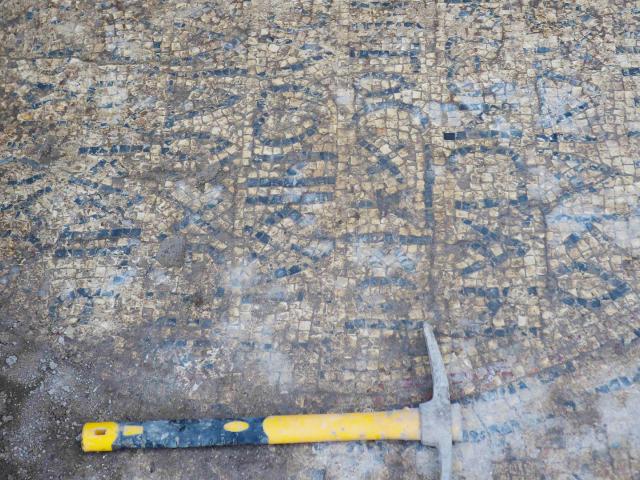
Archaeologists in Galilee Unearth Ancient Discovery Linked to Apostle Peter
JERUSALEM, Israel – A team of archaeologists has discovered an inscription near the Sea of Galilee that points to the Apostle Peter and his role as one of the leaders of the early Church.
The team, led by Prof. Mordechai Aviam and Prof. Steven Notley, unearthed the Greek inscription during excavations at the Church of the Apostles in what is believed to be ancient Bethsaida. As CBN News previously reported, experts believe this Byzantine-era basilica was built over the home of Jesus’ disciples Peter and Andrew.
The inscription reads “Constantine, the servant of Christ,” and continues with a petition for intercession by Peter, “chief and commander of the heavenly apostles.” The words are framed by a round medallion and form part of a larger mosaic on the church’s floor.

Inscription from Church of the Apostles. Credit: Zachary Wong
According to excavators, the title “chief and commander of the heavenly apostles” was frequently used by Byzantine Christians to refer to Peter.
"This discovery is our strongest indicator that Peter had a special association with the basilica, and it was likely dedicated to him. Since Byzantine Christian tradition routinely identified Peter's home in Bethsaida, and not in Capernaum as is often thought today, it seems likely that the basilica commemorates his house," Notley, the academic director of the dig, said in a statement.
Kineret College archaeologist Dr. Mordechai Aviam has been leading the excavation on the northern shore of the Sea of Galilee for years. His team found the Church of the Apostles in 2019, two years after they discovered what they believe to be biblical Bethsaida.
“One of the goals of this dig was to check whether we have at the site a layer from the 1st century, which will allow us to suggest a better candidate for the identification of biblical Bethsaida. Not only did we find significant remains from this period, but we also found this important church and the monastery around it," said Aviam, archaeological director of the excavation.
Quick Start Podcast: Ex-Psychic's Warning for Christians
According to the Bible, Bethsaida was the hometown of Andrew, Peter, and Philip. The Gospels say Jesus fed the five thousand and healed a blind man near Bethsaida.
Bethsaida later became a Roman city named “Julias.”
"Now what is the city of Julias? We were talking about Bethsaida!" Aviam told CBN News during excavations in 2017. "Josephus Flavius, the Jewish historian in the first century, tells us that King Phillip, the son of Herod the Great, who ruled from there to the Golan, toward Damascus – ruled this area – decided to upgrade the village of Bethsaida and to make it a polis [city], by the name of Julias, after the daughter of Emperor Augustus."
Scholars believe it was near the fishing village of Bethsaida where Jesus fed the multitudes with five loaves and two fish. Aviam says Roman remains at the site, including coins and a Roman bath, are further evidence that his team may have located ancient Bethsaida.
The archaeologists will resume excavations in October, hoping to unearth more biblical discoveries.
***Please sign up for CBN Newsletters and download the CBN News app to ensure you keep receiving the latest news from a distinctly Christian perspective.***





